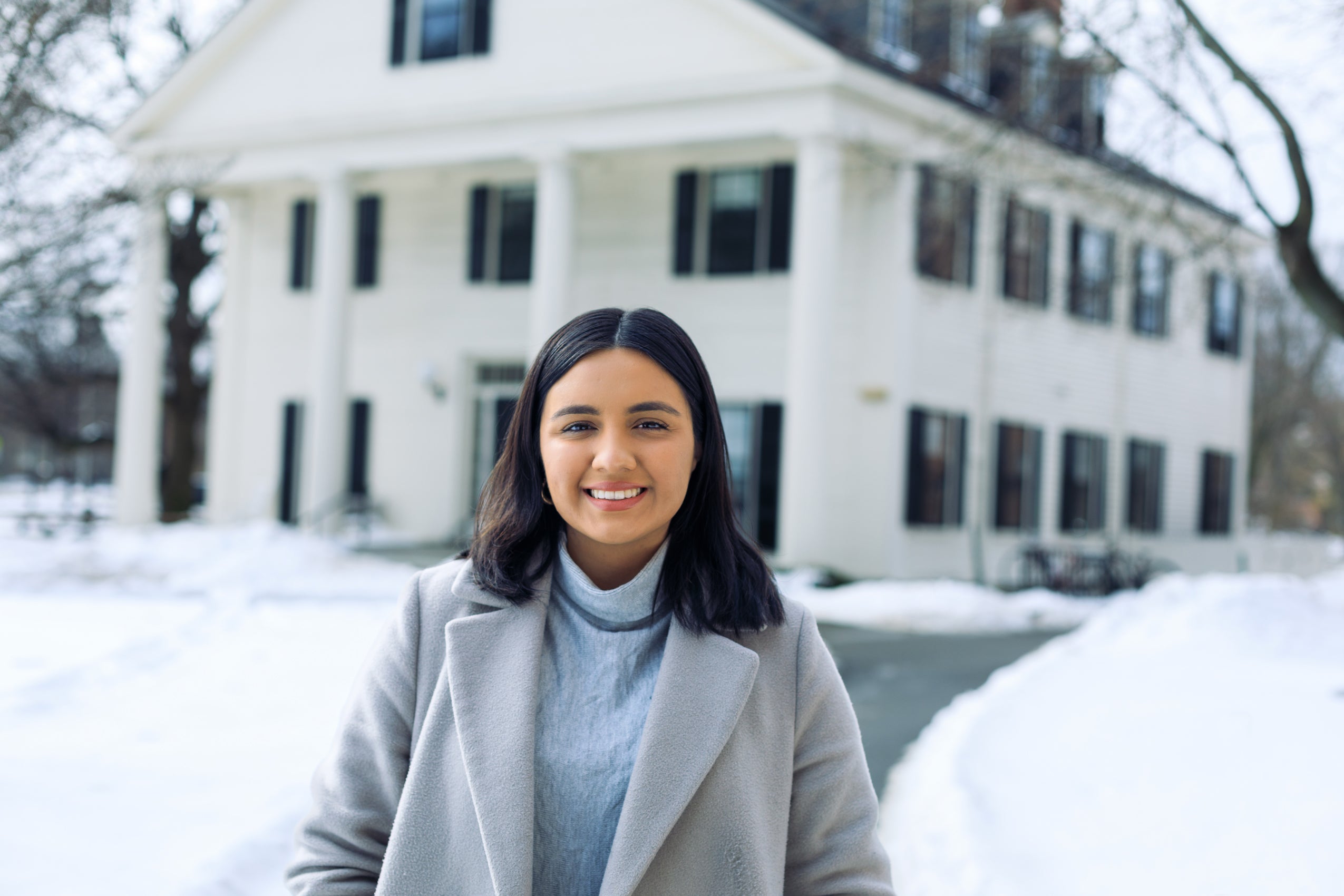On January 31, Priscila Coronado ’23 made history when she was elected by her peers 136th president of the Harvard Law Review, an independent student-run journal, becoming the first Latina to hold the prestigious position. The daughter of Mexican immigrants, Coronado says her background helped shape her perspective on the law, but cautions that she does not want her achievement to be “morph[ed] into some kind of ‘model minority’ narrative.”
“I believe with every ounce of my soul that there are countless other Latinas who are equally incisive in their logic and reasoning but will never get an opportunity like this,” she says.
In a Q&A with Harvard Law Today conducted via email, Coronado shares more about her background, what brought her to Harvard Law School, and her vision as the new president of the Harvard Law Review.
Harvard Law Today: Could you tell us a little bit about your life before law school?
Coronado: I was raised in Downey, California, a suburb in southeast Los Angeles. As the youngest daughter of two Mexican immigrants, I was the first in my family to attend college. I graduated magna cum laude from the University of California Los Angeles (UCLA) in three years, earning a B.A. in English with college honors, departmental honors, and Phi Beta Kappa. I was also the Community Advocacy Program Coordinator at the Disability Rights Legal Center before beginning my J.D.
HLT: Why did you decide to go to law school?
Coronado: I actually graduated high school and started at UCLA thinking that I was going to pursue medical school. However, I quickly realized that the medical field was not for me. I chose to major in English, another abiding interest, instead. I found that I loved reading, writing, and research. When it came to deciding what I wanted to do after college, I knew law school was the right fit for me. I would be able to combine my interests of reading, writing, and research while hopefully making meaningful change and interacting with people from different backgrounds. After college, I worked at the Disability Rights Legal Center in Los Angeles. Working there confirmed my interest in going to law school.
HLT: What inspired you to get involved with the Harvard Law Review?
Coronado: I got involved with the Harvard Law Review because I knew that I loved reading, writing, and research. I also thought it would be a great way to meet others who are interested in legal scholarship and that it would be an intellectually stimulating experience.
[Related: Harvard Law Review elects Priscila Coronado ’23 as its 136th president]
HLT: What else are you involved in at Harvard Law School? What kind of law are you interested in?
Coronado: I am involved with First Class (where I am a board member) and La Alianza. First Class is a student organization dedicated to first-generation and/or low-income students. La Alianza is a student organization for Latinx students. I am also very passionate about education law (specifically, special education law). I was at the Education Law Clinic last semester. I am now in the Child Advocacy Program Clinic.
The Review has made important progress on diversifying our board of editors, although there is still more work to be done. I’m hopeful that we will take further steps in my year as president
HLT: How does it feel to have been elected president of Harvard Law Review?
Coronado: It is an honor that my peers have entrusted me with this institution. I don’t take this role lightly. It also means a lot to be a part of a historic moment. I see my status as the first Latina to mean two things. On the one hand, I don’t want to downplay the achievement or the tangible way that growing up in a two-Mexican-immigrant working-class household has shaped my perspective on the law. They are fundamental to the editorial perspective I bring. On the other hand, I really don’t want my status as the first Latina president to morph into some kind of “model minority” narrative. I believe with every ounce of my soul that there are countless other Latinas who are equally incisive in their logic and reasoning but will never get an opportunity like this because of something as out-of-their-control as where they were born.
HLT: What is your vision for the Harvard Law Review this year?
Coronado: My goal for this year is to keep the Review running as smoothly as it always does. That would be a victory, since the Review’s normal operations put it at the vanguard of legal scholarship written in the United States. This is a testament to both the incalculably valuable work done by our editors and the legacy of stability and excellence left by previous presidents, such as my predecessor Hassaan Shahawy [’22]. Also, the Review has made important progress on diversifying our board of editors, although there is still more work to be done. I’m hopeful that we will take further steps in my year as president. I believe in the importance of diversity at the Review not only because of my own background, but because I’m convinced that diversity is essential to our mission of publishing rigorous scholarship. The whole point of peer review is to run legal scholarship by a different set of eyes to publish the most cutting-edge research. Having a diverse set of editors follows that principle: The more backgrounds we have represented in our body of editors, the greater variety of interests, backgrounds, and experiences we can draw on to make our scholarship better.
HLT: What do you like to do for fun?
Coronado: I love spending time with my seven nieces and nephews. We particularly enjoy getting boba together. I am also a huge reality TV fan.
